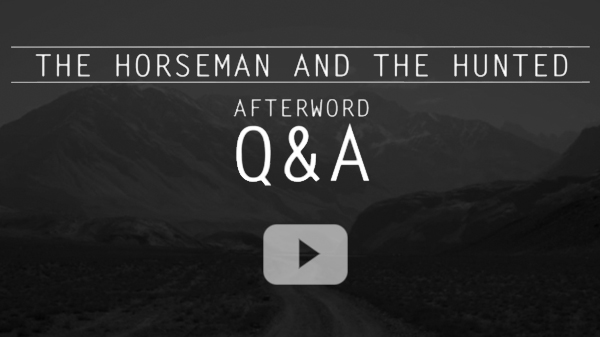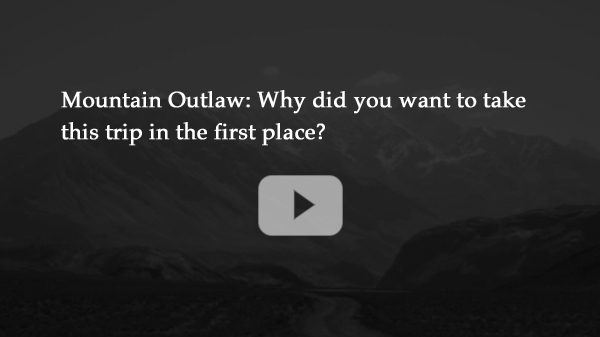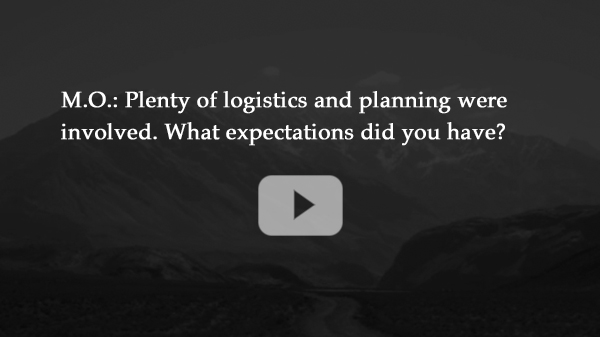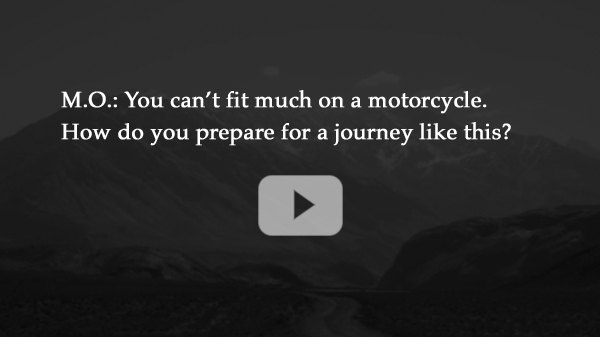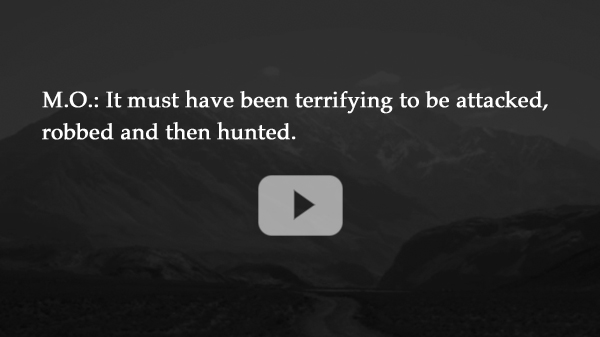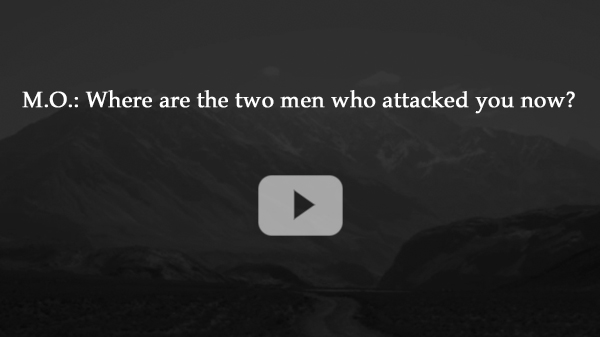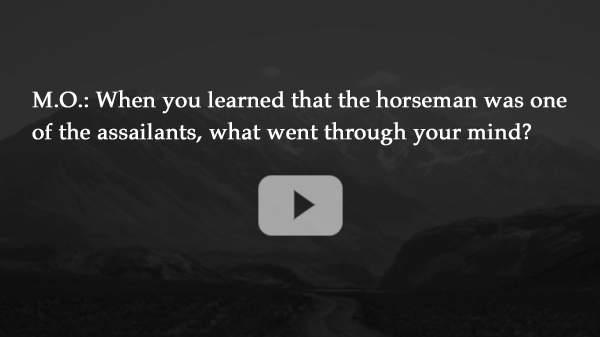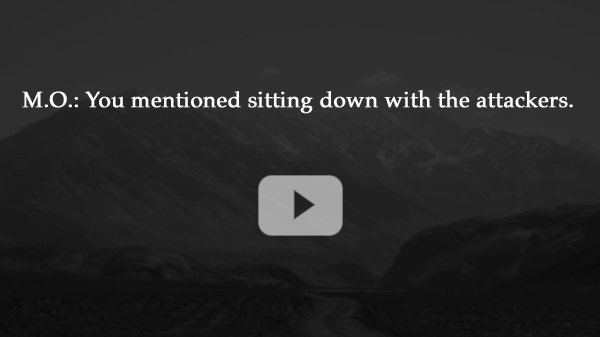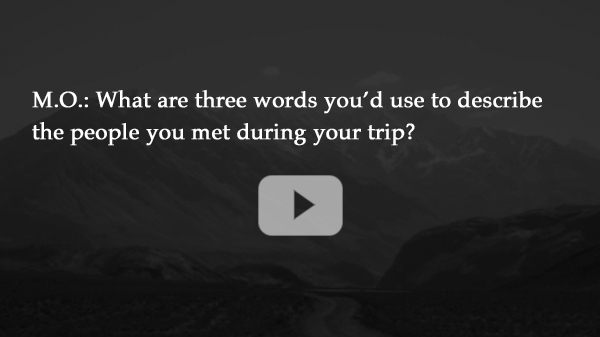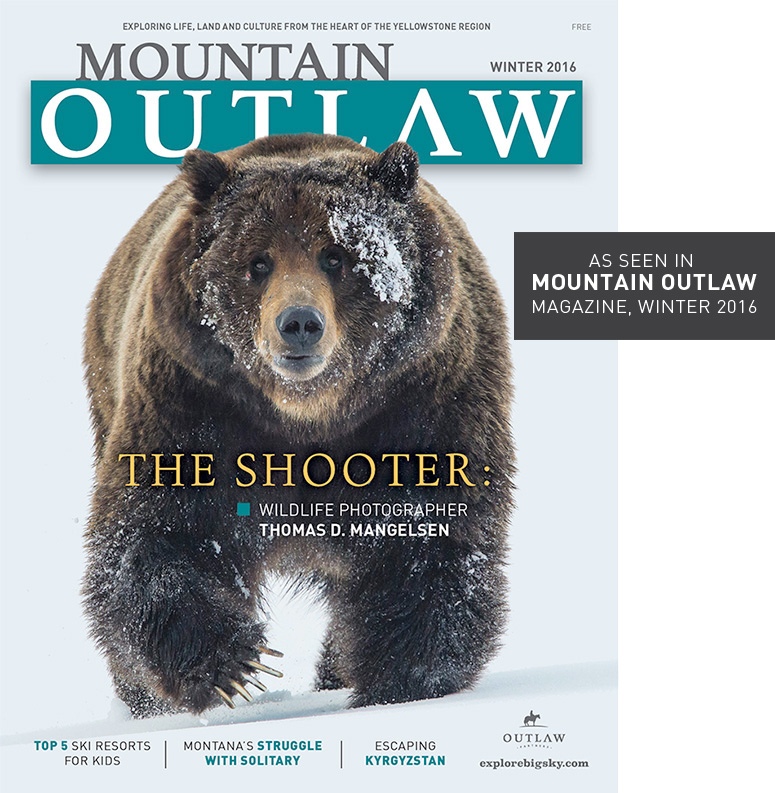Chad Rothacher was exploring remote regions on a solo motorcycle trip across Central Asia. When he was attacked in his tent one night in Kyrgyzstan, he thought he’d just been robbed. Then the assailants returned to kill him.
BY: CHAD ROTHACHER
PHOTOS BY: WES OVERVOLD & CHAD ROTHACHER
VIDEO BY: WES OVERVOLD & JOSEPH T. O’CONNOR
A month earlier, on May 8, 2015, I left Montana for a 6,500 mile, solo motorcycle trip through Central Asia to explore and to test my navigation skills in the most remote and challenging environment I could find.
Departing Istanbul, Turkey, on my KTM 1190, I headed for Almaty, Kazakhstan, and all that lay between. I investigated Eastern Turkey, the wine region of Georgia, and the oil-rich town of Baku, Azerbaijan. Arriving at Baku and the Caspian Sea, I had a choice: hire a “fixer” to get me through Iran, or walk the shipyards looking for passage across the Caspian.
I played it safe securing a trip on an old Russian freighter, and four days later docked in Turkmenistan. The U.S. State Department in 2014 called Turkmenistan a “country of particular concern” for its record of religious persecution, and I made quick tracks to neighboring Uzbekistan then onto Tajikistan.
This region was decidedly challenging to navigate on the bike, and at one point I found myself laying on a goat-track road after crashing near the northern Afghan border with my bike precariously balanced above a raging, glacial-fed river. Two pulleys, fixed anchors, and a mini-winch later, I was riding north to Kyrgyzstan. The next day I was fighting for my life.
“I listened to the men for a minute or so hoping they would leave, then looked out the tent’s side door and caught the eyes of a man peering back at me. Before I could say anything, the men leapt on me and began smothering my head.”
Excerpt below adapted from daily blog at chadrothacher.com.
June 5
8 a.m. – Today I took a back road to Naryn, Kyrgyzstan, which will connect me to Lake Issyk Kul in two days. I stopped at a market to pick up fresh tomatoes, cucumbers, bread, and a couple duck breasts then rode up the canyon and found a perfect spot along the river to set up camp.
As I unloaded the bike, a local goat herder on horseback stopped by and we began a hand-gesturing conversation interspersed with some broken Russian I picked up on the Internet before I left. He asked the typical questions: where I’m from, how long I’m staying, if I have cigarettes or anything to eat. I tossed him a tomato and he asked for a second for his friend who sat on his horse by the road. With only one tomato left for dinner, I told him no and both men departed smiling about the mini bounty they just scored from the traveler.
I’ve been eating nothing but pasta variations for a few weeks now, so ever since I found the duck breasts at market, dinner’s been on my mind. The simple salad and fried duck was the finest meal of the trip so far – certainly topping the countless nights of noodles or mixed bag of the local fare. After dinner I stripped down for a bath in the icy cold river, then crawled into the tent to catch up on my photo downloads and journal entries. I fell asleep around 9 p.m., clean, and with a full stomach.
10:30 p.m. – I woke up to the sound of voices outside my tent. I could hear two men talking, and first assumed it was a couple locals stopping by with good intent. It’s common in this part of the world for people to visit at all hours of the day or night to say hello. I listened to the men for a minute or so hoping they would leave, then looked out the tent’s side door and caught the eyes of a man peering back at me. Before I could say anything, the men leapt on me and began smothering my head. I felt one of my worst fears was starting to unfold – a kidnapping for ransom.
The men roughed me up with punches to the side of the head and midsection, but with all the tussling and down feathers, nothing landed with any substance.
When the beating ended, the man on my back switched tactics and tried getting a bag over my head, which was still partially buried in my sleeping bag and under the shredded tent fabric. This confirmed my fear: A robbery was one thing, but kidnapping was an altogether different program, and something I couldn’t afford.
I don’t travel with a weapon due to border crossing requirements and differing laws between countries, but carry a small hatchet for various camp duties; it could potentially be used for self-defense.
During the next few minutes of the struggle, I decided if things went further south, I needed enough energy to break away from the assailants, grab the hatchet nearby, and start swinging. The man on my back was lightweight and weak, and I knew I could throw him in an instant and go for the hatchet. If I could limit the damage and keep from being stuffed in their vehicle, I’d be OK losing a few belongings. I had no plans of exacerbating the situation over a few items or the little cash I was carrying.
Over the next few minutes, I put up just enough fight to let the attackers know I wasn’t completely giving up. As long as I could keep the men from moving me, didn’t exert undue energy, or get beat unconscious, I felt in control. But when the man on top of me realized I could move at will, he gave up on the bag and tried to get a rope around my neck.
I somehow caught the noose with my right hand at forehead level and it was crystal clear that if the line made it to my neck, it would be the end. My mind fixated on controlling my portion of the rope.
10:45 p.m. – I went back to work on the bag zipper with my left hand. This apparently wasn’t as subtle as I thought, and I received the first blow to the back of the head. Stars appeared. A few more seconds and another blow – more stars than last time. I knew I couldn’t take many more of these before I lost consciousness. The final blow caught me square in the back of the neck, and my head pounded as I struggled to keep conscious, still fixated on keeping the noose from slipping around my neck.
The assailant adjusted and tightened his grip on the rope, and I could hear the other man going through my bags. I knew this would soon be over, and my thoughts shifted to what might happen next. Would they throw me in the river? Start beating me again? Kidnap me? Kill me? It might have been a fear from my kayaking days, but now my biggest concern was getting thrown into the fast-moving, frigid river, while still in my sleeping bag – I would surely drown.
I knew it at the time, and it was confirmed later by one of the Kyrgyzstani military officers – the two men came back to kill me.
One more crashing forearm blow to the back of the neck snapped the thought out of my head, and the man started yelling at me as he loosened his grip. I assumed he was telling me to keep my head down, as he jumped off and ran. I looked up as the two men crested the hill. It was dark. The moon hadn’t yet made its way into the canyon, but I could vaguely see the headlights as the car sped off.
11 p.m. – I got up, dressed, and took inventory. The robbers are gone, what next? I was still hazy from the blows to the head, and not thinking clearly. At some point I realized the gravity of the situation and needed to get my head straight to make a plan. I decided to pack up the bike and move in the opposite direction of the car. As I packed gear at random, I realized my electronics bag was missing, which had my iPad, navigation system, passport, emergency beacon, and satellite phone – there was no way to send an emergency signal or call for help. I knew I couldn’t find my way to the next town on the labyrinth of roads in the night without navigation, and had no choice but head in the same direction as the robbers, and back to Naryn.
I loaded my bags on the bike and realized my key was missing – it was in my electronics bag. “No problem,” I thought, “I have a spare in my pack.” I found the key, put it in the ignition and went to fire it up – nothing. I tried again, nothing. The next two attempts brought the same result. I was stuck.
The robbers didn’t get my wallet or cash – “Not too thorough for robbers,” I thought. It then dawned on me: They might come back once they discover the bag only had a few dollars worth of Uzbekistani som. My only option was to hide until morning. I grabbed my sleeping bag, headlamp, hatchet and Leatherman, and searched for a spot to wait out the night.
11:30 p.m. – My options were limited. I was camped on the only flat piece of ground on the valley floor, the small campsite surrounded by steep canyon walls; I was in a bowl surrounded by water on two sides at the river confluence, a cliff on the third, and the road directly above me. I found a spot 50 yards from camp, and curled up with my sleeping bag, headlamp and hatchet.
It wasn’t long after I wrapped my bag around me that I saw headlights coming from the direction the robbers fled, and ducked down as the lights went by. No problem, just traffic. But the passing car gave me the idea to flag down the next vehicle headed toward Naryn, and have them drop me at the police station – it seemed better than laying on the wet ground until morning.
11:45 p.m. – Headlights coming down the road. As the car approached, I ran up the hill waving my arms and headlamp. It wasn’t slowing down much, so I lowered my light on the vehicle and saw two young men in a white car approaching. “Shit, did the robbers double back?” They stopped beside me. The driver didn’t look over but I saw the passenger start to get out, so I quickly moved over to meet him, hiding the hatchet behind my leg. I told him I needed to go to Naryn. He shook his head, no. I repeated myself, and got the same answer. He just stood there looking at me with his hands in his pockets – was he hiding a knife? A gun? Something wasn’t right.
I gave him a friendly “OK, goodbye” nod and started to back off. He turned and got in the car as they slowly drove away. I looked for a license plate that wasn’t there. “Holy shit,” I thought. “I was just face to face with one of the robbers.”
12:00 a.m. – I returned to my hiding spot to wait it out – no way was I flagging down another car tonight. No sooner did I think, “Only six hours left, no problem,” when I saw headlights coming up the road again, from the direction of Naryn. I heard a police siren and a man on a loud speaker. It sounded like police, but there were no flashing lights. “No way, it couldn’t be the police,” I thought. I didn’t buy it. The car pulled to a stop, and I watched the silhouette of a man get out and walk down the hill carrying a small light. I remembered the hint of a bluish glow during the robbery, and the light headed my way clearly had the blue tint of an LED. It was too familiar; no way was I coming out of hiding. The man started whistling and yelling.
I knew it at the time, and it was confirmed later by one of the Kyrgyzstani military officers – the two men came back to kill me.
While the man searched the area with his light, I left my sleeping bag and slithered into the brush that lined the riverbank. I knew to keep quiet and find a position I could defend from, as well as attack if need be. A patch of heavy brush bordered the east end of the campsite, with only one obvious way around. If they came toward me, they’d surely walk around the brush through this clearing. I decided to hide on the other side, where I could see them before they saw me. My plan was to shine my headlamp in their eyes when they rounded the corner and determine if they had weapons or not. If they did, I’d have to attack instantly. I held on tight to the hatchet in one hand and the headlamp in the other, ready to jump.
1:00 a.m. – I was a statue while they combed the area for me then I heard car doors shut. But the vehicle didn’t pull away. They were waiting me out.
With the men directly above me on the road, I sat as still as possible, my legs intermittently falling asleep. My mind wandered to my family, and I had to fight off the thoughts. I focused on every sound, every shadow, every movement I saw in the darkness. My life depended on it.
Every time my mind drifted, I snapped it back to focus on my surroundings. I could feel the slightest puff of wind; hear a mouse in the grass (which sounded like an elephant); smell the willow trees and the dirt below me. I watched every shadow move as the moonlight slowly worked its way down the canyon walls. I’d never been so focused as I was during those haunting hours.
2:30 a.m. – I finally heard the car leave, but still had a terrible feeling they’d return or that this was just another attempt to lure me out of hiding. The police impersonation didn’t work; I was sure the silent attack would be next. There was nothing I could do but sit on the cold, damp ground and continue to stay acutely focused until daylight.
6 a.m. – I was starting to turn hypothermic, but the graying morning gave me enough light and courage to come out of hiding. I had to get to Naryn and find the police station. First I’d have to stash my gear and motorcycle in the brush hoping it would be left alone.
9 a.m. – When the first vehicle approached, I ran up the embankment and jumped in front of the car, undoubtedly startling the passengers. Ironically, they probably thought I was going to rob them. As soon as I told my story and we headed down the road, I felt the flood of emotions engulf me. The gravity of the situation became clear: I was stuck in Kyrgyzstan with no passport, no visa, no proof of motorcycle ownership (or any way to move it), and limited communication. I had no choice but to keep my shit together and figure a way out of this mess.
I traveled back to Naryn the next morning and spent the day interviewing with journalists and trying to negotiate the return of my motorcycle.
June 6
I arrived at the local military post around 11 a.m. to find a few Kyrgyz officers, and none who spoke or understood English. I kept telling the officers, “Embassy, embassy,” and pointing to the phone. After some convincing, I made it through to the U.S. Embassy in Bishkek and quickly found out they couldn’t do anything until I went to the capital city, about five hours away. As soon as I passed the phone back to the officer, he started yelling at the embassy operator and abruptly hung up. My heart sank – this guy just hung up on the embassy. “Now I’m really screwed,” I thought. There was no American cavalry coming to get me out of here.
After a very exhausting day of driving around with a few military officers and Saykal, a local woman who helped translate, I was finally dropped off at a dumpy hotel with strict instructions not to leave the building. After a failed attempt at a shower (there was no water in my room), I hit the sack, my head still spinning from the past 24 hours.
June 7
Today it became quite clear the military had no desire to let me leave Naryn. The corruption ran deep and I knew I had to get out of there before I was moved to a holding cell for my own “safety.” There was no clear line on who I could trust, so I put my faith in Saykal and asked her to help me arrange transport to Bishkek, some 300 miles away. Early the next morning, I quietly left the hotel and met the driver at 4 a.m. in the alley for a long ride to the capital city.
June 8-11
First thing Monday morning I showed up at the Embassy expecting a sense of elation similar to what you might see in movies: The guard lets you through the gate onto green grass with Americans strolling around, and you’re now free to move about on U.S. soil. It wasn’t the movies. I was shocked to find locals, contracted as security guards, working both sides of the gate. There was no feeling of my native soil, just a couple Americans who could help very little. I was just a number stepping up to the glass, explaining my story to the clerk on the other side. I was crushed.
The next few days were spent trying to get a temporary passport – which Kyrgyzstani border guards don’t want to accept upon leaving the country or entering the next – as well as securing a new visa and technical passport for the bike.
I received a call from Saykal on the night of the 9th informing me the officers had caught the robbers, one of whom was the horseman I met six days prior, and recovered most of my items. I traveled back to Naryn the next morning and spent the day interviewing with journalists and trying to negotiate the return of my motorcycle. I finally exchanged cash for my items, and left town. Riding through the night, I made it back to Bishkek early the next morning.
June 12
After a grueling eight hours of being hassled at the Kyrgyzstan border crossing, I crossed into Kazakhstan and arrived in Almaty around midnight. I secured shipping the following day and left for the U.S. the morning of the 13th, arriving that same evening (a 32-hour time difference) in Big Sky, Montana to a very concerned family and dog.
I’ve kept in touch with Saykal, who agreed to act on my behalf in the following months as the trial progressed. She’s told me on numerous occasions that she feels a duty to her country to stay involved with the case to the end.
CHAD ROTHACHER grew up in the mountains of northwest Montana with a knack for practical mechanics and the ability to teach himself anything he set his mind to. With a passion for the outdoors and solo adventure travel, Rothacher balances his time between biking, skiing, travel, family, and RMR Group, his custom home construction business in Big Sky, Montana.

 WATCH INTRO VIDEO
WATCH INTRO VIDEO